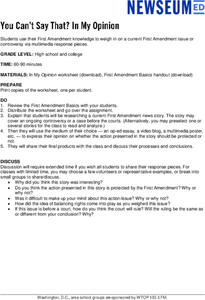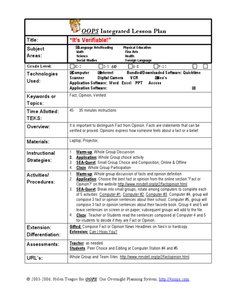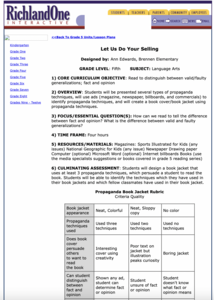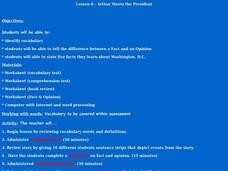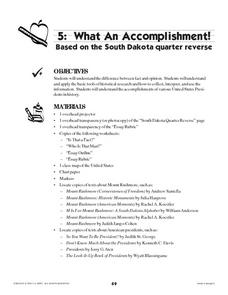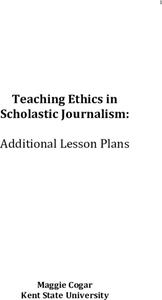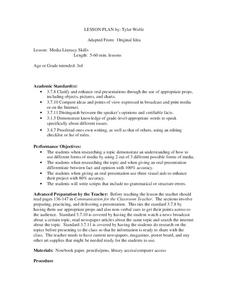Curated OER
Identifying Facts
Students evaluate what a fact is and what the characteristics of a fact are. In this fact and opinion lesson, students read through chapters in their books and point out facts that they find that cannot be disputed.
Curated OER
Opinion
An important concept for youngsters to learn is that there is a difference between facts and opinions. Use Kirsten Hall's Animal Touch to introduce the idea that an opinion is how one feels or thinks about something and that others are...
Curated OER
Understanding and Using Primary and Secondary Sources in History
Explore primary and secondary sources in this historical analysis lesson. Young researchers define the terms primary source and secondary source. They read a primary source document provided by the teacher and answer questions about the...
Curated OER
In Legal Limbo
Newspapers are great learning tools. They act as a conduit for current events, reading comprehension, and critical thinking. Here, pupils read a New York Times article regarding US immigration law under the Obama administration and...
Curated OER
The Value of Facebook
Does Facebook actually have any value? Find out what the New York Times thinks by reading this informational article. Learners use the 10 guiding questions to aid them as the read the provided article regarding the value of Facebook. Two...
Curated OER
Information from Posters
Budding journalists examine and evaluate an informative poster advertising a public meeting to discuss city park issues. They write a paragraph explaining what they found to be effective and ineffective about the poster, then imagine...
Newseum
You Can’t Say That: In My Opinion
As a part of a study of the First Amendment, high schoolers research a current news story that seems to involve one of the freedoms granted by the First Amendment. Investigators decide whether they think the action presented in the story...
Curated OER
"It's Verifiable!"
Students examine the differences between fact and opinion. They define fact and opinion, evaluate their favorite fact or opinion on a website, and in small groups write sentences using facts and opinions about school and their favorite...
Curated OER
Let Us Do Your Selling
Sixth graders analyze several types of propaganda techniques and create a book cover using the techniques. In this propaganda techniques instructional activity, 6th graders analyze the propaganda techniques used in various ads. Students...
Curated OER
Nutty About Peanut Butter
Students brainstorm list of lunchtime sandwiches, identify difference between fact and opinion, research facts about peanut butter online, complete Nutty About Peanut Butter worksheet, and create their own fact and opinion worksheets...
Curated OER
Arthur Meets the President
Students read, Arthur Meets the President, and review the story using sentence strips and complete a book review activity with a partner. In this reading skills lesson, students work on fact and opinion and master fluency with...
Curated OER
What an Accomplishment
Students identify and discuss the images on the back of the South Dakota quarter. They discuss the differences between facts and opinions, and research information about the four presidents memorialized on Mount Rushmore.
Curated OER
America Attacked: 9/11
In this America Attacked: 9/11 worksheet, students read the book America Attacked: 9/11 and complete fact and opinion, character detail, and short answer question activities. Students complete 26 questions.
Curated OER
Slumdog Millionaire
In this Slumdog Millionaire worksheet, students read the book Slumdog Millionaire and complete fact and opinion, character detail, and short answer question activities. Students complete 26 questions.
Teaching Tolerance
Where We Stand
Everyone is entitled to their own opinion. Academics learn strategies to share their opinions and agree or disagree with others in a respectful manner. The resource provides scenarios to help individuals form opinions and share them with...
News Literacy Project
Get Smart About COVID-19
Pandemic or infodemic? Scholars complete an online quiz to determine if they can sort fact from fiction related to COVID-19 information. Pupils view a variety of news articles, social media posts, and video clips to practice identifying...
Kent State University
Teaching Ethics in Scholastic Journalism
Events in recent years have underscored the importance of a free and independent press in a democracy. Young journalists engage in lessons about the function of journalism in a democratic society, practice the steps of Bok's Ethical...
Curated OER
Determining Author's Point of View: The Sneeches
Determine the author's point of view in a text. Young readers read Dr. Seuss' The Sneeches and identify the author's purpose in the story. They identify persuasive techniques in writing, asking and answering questions to better...
Curated OER
Scapegoating and Othering
Scapegoating and "Othering" is the focus of a series of activities that ask groups to consider how these behaviors contribute to hatred and intolerance. Groups are given a scenario and discussion questions based on the situation. Whether...
The New York Times
Evaluating Sources in a ‘Post-Truth’ World: Ideas for Teaching and Learning about Fake News
The framers of the United States Constitution felt a free press was so essential to a democracy that they granted the press the protection it needed to hold the powerful to account in the First Amendment. Today, digital natives need to...
Curated OER
Study Skills- Fact and Opinion
Learners engage in a variety of activities in order to achieve the objectives of a layered curriculum unit. They take notes on the differences between fact and opinion. Students also use a newspaper in order to recognize opinionated...
Curated OER
Media Literacy Skills
You're on camera! Third graders find a news story and research it to get more information. Everyone uses their found information to write a script and create their own news broadcast!
C-SPAN
Polling and Public Opinion
Most people are eager to offer their opinions about topics of interest, but what's the most effective way to collect and assess these opinions as a matter of fact? High schoolers learn about the history of polling, as well as the...
EngageNY
Identifying Author’s Opinion and Evidence: The Value of Sports in People’s Lives, Part I
Just like instant replay, it's time to take a closer look! Pupils work together to add ideas to a Close Readers Do These Things anchor chart. They then put their knowledge to the test as they read an informational article about the...
Other popular searches
- Fact Opinion Lesson Plans
- Fact and Opinion Passages
- Fact Opinion Worksheet
- Fact and Opinion Lessons
- Teaching Fact vs. Opinion
- Fact and Opinion Worksheets
- Teaching Fact and Opinion
- Fact and Opinion Games
- Reading Fact and Opinion
- Fact and Opinion Keywords
- Identifying Fact or Opinion
- Fact Opinion Quiz








